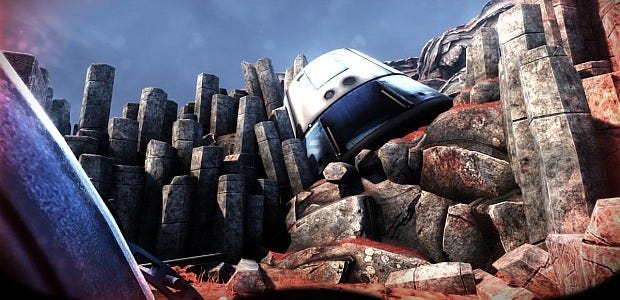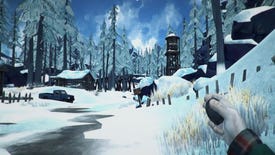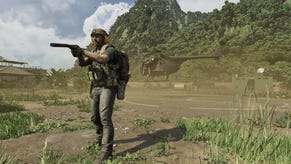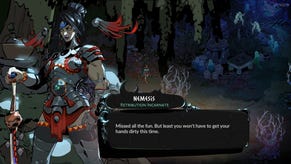The Solus Project Casts You As Humanity's Only Hope
Survival on an alien world.
Humanity no longer has a home. Earth has been destroyed, and all that remains of it is on a nomadic fleet of ships searching for a place to rebuild their civilization. In The Solus Project, you take on the role of a surveying team charting an Earthlike planet that may just prove suitable for humanity's resettlement. Disaster strikes suddenly and you find yourself marooned on the surface of Gliese. Armed with only the most basic knowledge of the dangers the planet holds, you must set out to solve the mystery of the destruction of your ship, and contact your fleet for rescue.
The Solus Project could easily be mistaken for another sci-fi themed survival game.
To an extent it is. You’ve seen these mechanics over and over, and with every new survival title that joins Steam Early Access, you’ll continue to see them crop up. You do have to find food and water, make sure you're warm and dry and get the right amount of sleep.
The difference is that, like so many other similar games, building isn't the focus here. You're not looking for permanent shelter or to set up a forge and blacksmith alien ingots. You'll need to be on the move most of the time, and in that way, The Solus Project is more of an adventure game sprinkled with elements of survival, and to be frank it works much better this way.
From the start of the game at the crash site, you're very much on your own. You do have a PDA, but it can only give you basic information on the world around you as far as some “survival suggestions” that aren’t always the most useful guidelines to follow. Instead, you have to explore, explore, explore. And by "explore," I mean you've got to examine the environment as thoroughly as possible and remain alert at all times, just like you’d do in real life. Most of your time is spent searching for items you may require to perform certain tasks or craft better supplies. For instance, you'll have to tear apart pieces of your own newly-derelict spacecraft to piece together early shelter and additional items. Later on, fresh water and sustenance is the order of the day, and it’s up to you to seek it out if you want to avoid dying of hunger. You've also got to watch out for sudden shifts in the atmosphere, as any moment could send a whirling cyclone your way that you've got to take shelter from.
If it’s not the weather, it’s your lack of supplies. If it’s not your lack of supplies, it’s your lack of preparedness. It’s a brutal frontier, and you’ve got to be able to handle it. With so much on your plate the focus is removed from building and more on keeping alive by any means possible. With the removal of the need to always worry about building, the exploration aspects of games like Minecraft and Ark: Survival Evolved come to the forefront.
The Solus Project won't hold your hand, either. In fact, the only real direction you'll receive lies at the beginning of the game in the form of a brief tutorial. Much like a real disaster in which you may find yourself stranded on an uninhabited alien planet, you've got to rely on your wits to survive. That very well could be why I found myself so irresistibly drawn to the game. Too often we expect to be shepherded throughout open worlds that beckon to us, and being left alone to my own devices was a refreshing change of pace. You’re forced to head out and see the alien world you're on with your own eyes.
Interestingly enough for this type of game, there are no procedurally-generated lands here. I went in expecting the terrain to change shape and alter itself as the game wore on, but that wasn’t the case. The whole map is very carefully laid out; a chilling expanse rife with gorgeous alien foliage in one area to threatening mountain ranges with areas that practically beckon to you to come partake in what they have to offer. If you see it, you can reach it, and you'll thrill in doing so. The dynamic weather system is one of the most impressive features about the game too. The atmosphere-rich environment creates unique instances, where you might find chilling temperatures in one area and run the risk of dying from hypothermia or find yourself responding to the humidity in another.
It can be difficult to conceptualize where you are in relation to your manmade shelters or the caves you've uncovered, and thus it's a great throwback to the days of games where you might need to make your own maps, which I readily did with MS Paint and haphazard text. I also found myself scribbling down notes as far as how to ride out a storm, what I needed to do in order to find fresh water, and how to approach the dangers of the world.
For those who relish in leaving no stone unturned, the game is incredibly rewarding. There are hidden areas and secrets galore, and most of them can be entirely missed if you just stick to the core mission objectives of surviving. You’ll miss out on some revealing notes, for example, that offer some insight into the overarching narrative. They’re absolutely worth seeking out, too. A great analog would be the FPS games of the mid-to-late ‘90's. Sure you could finish Duke Nukem or Rise of the Triad without entering a single secret area, but not doing so took a lot away from the experience.
There is a drawback, however, to playing the game in its current state, which is that The Solus Project is extremely short. While I spent 3-5 hours exploring the area, without scouring I could easily have completed this first segment of the game in a an hour or an hour and a half. The current Early Access build is just the first part of many, and it's a bit frustrating to reach the end of Part 1 and get a screen telling you to wait for Part 2. It's doubly annoying since right before the first part ends, you start acquiring additional clues as to what might be going on.
What’s interesting to note here is that the game isn’t being released as individual “episodes” as per Telltale Games’ publishing model, but instead in segments that are being added to the base game one by one. However, unlike so many Early Access games, I can already see the shape of the game it's becoming, and maybe the fact that I was so irritated by the abrupt ending serves to show how involved I had become.















